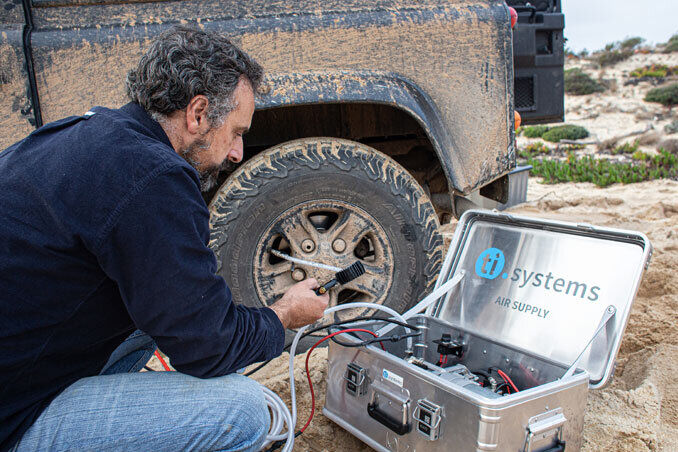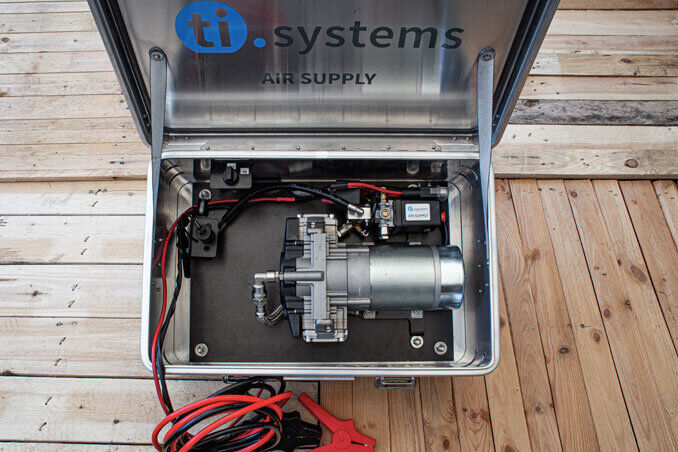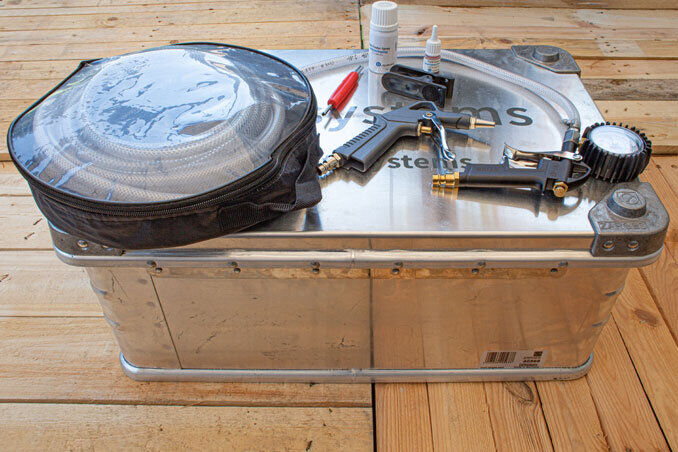Adjusting tyre pressure to suit any terrain can make all the difference between steady progress on your journey or an exhausting and lengthy salvage effort (but that can be fun too!).
Early in 2019, we tested an integral ti.systems tyre inflation system in a Toyota Landcruiser. So when we started looking for a portable version, we were excited to learn that ti.systems was already working on a solution directed at the large community of 4×4 drivers.
ti.systems is no newcomer to the overlanding scene. With a track record spanning more than 25 years working with the armed forces, emergency services, mountain rescue, mining companies, specialist expedition vehicle builders, and commercial truck manufacturers including Iveco, MAN, Mercedes-Benz and Scania, it is fair to say the innovative company near Düsseldorf, Germany, has been confronted with and solved just about every problem even the most extreme overland traveller is likely to encounter.
As far as 4x4s such as Land Rover, Toyota, G Wagons, Nissan & Co. are concerned, they are seldom equipped with pneumatic brake circuits or compressors. Even though the benefits of down-pressuring are well known, there is still a debate as to whether or not the additional expense and weight implications of a tyre inflation system are a worthwhile investment. Mind you, my personal tally of hours spent wielding shovels as I collected material for amusing campfire tales certainly tips the scales in its favour.
WHY TYRE PRESSURE REGULATION?
ON THE HIGHWAY Maintaining the correct tyre pressure ensures you minimise tread wear, maximise fuel efficiency, enhance safety, ride in comfort, and reduce your vehicle’s emissions to the benefit of the environment.
OFF PAVEMENT Reducing tyre pressure and thereby increasing the footprint significantly improves flotation on soft terrain such as sand, snow, mud, etc., with the added benefit of vastly increasing traction and protecting nature by minimising surface damage.

PORTABLE OR PERMANENTLY INSTALLED?
Permanently installing one of ti.systems proven compressors and pressure regulation systems into your vehicle comes with the luxury of simplifying the deflation and inflation procedures—even remotely from the cockpit. However, if we look more closely at our own expeditions and travel preferences, Lost Cultures, Forgotten Heroes expeditions are essentially based around our team vehicles which include Land Rover Series 2s and Defenders. Furthermore, we are occasionally accompanied by other vehicles including anything from Toyota Land Cruisers to Unimogs and adventure motorcycles. Equipping every vehicle with its own tyre inflation system would entail duplicated financial investment and, as far as the bikes are concerned, verge on the impossible. One portable system, on the other hand, ticks all our boxes as far as versatility and performance are concerned—whilst minimising financial burden.
ti.systems PROTOTYPE
There are already manufacturers producing tyre inflation systems ranging from budget-priced low performing compressors (which are plugged into the 12V cigarette lighter socket) to system solutions which may also power diff-locks—names that immediately spring to mind are ARB, VIAIR. Each system has its merits but, for one reason or another, did not satisfy our selection criteria. As mentioned earlier, we tested a ti.systems tyre inflation no so long ago. So, we approached the experts and were pleasantly surprised to learn that initial steps had already been taken to create a portable system in response to other 4×4 drivers posing similar questions …
The first thing that met with my approval was the stackable and sturdy Zarges K470 aluminium case which harmonises perfectly with the cases we already use for our photographic equipment and other gear.
Inside the case, space is dominated by the permanently mounted 12V/65A K120 twin cylinder oil-less compressor which is accompanied by:
- mounted on/off switch
- 3 m of power cables with heavy duty battery clamps
- deflation/inflation gun (psi, kg/cm2, kPa, bar) with hi-flow valve attachment
- blow gun
- 4 m braided hose with snap connectors
- 4 m braided hose for conventional tyre valves
- hose/valve repair kit
- adapter valves—ti.systems’ to conventional valve for inflating at a fuel station

EVALUATION
In Portugal, we were given the ideal opportunity to put ti.systems to the test in a real-life scenario amidst dune landscapes with our own and other participating vehicles.
PRACTICAL EXPERIENCE
Using ti’s patented tyre valves with their larger cross-section, down-pressuring is certainly quick, but they really come into their own by making re-inflation up to eight times faster than with conventional valves. Inflating the Defender’s 235/85 R16 BFGs took approximately 1 minute each.
OUTPUT
Despite the ISO guidelines, measured output can vary depending upon ambient temperature, resistive pressure, and input voltage. In accordance with the ISO standards, ti.systems quotes 120 litres per minute at 1 bar resistive pressure.
DUTY CYCLE
This is not so relevant if you are travelling solo and only want to refill your own tyres. But if you have several vehicles to attend to, then you’re going to need to pay attention to the amount of time the compressor can work versus the necessary downtime. The K120 compressor is rated for 20 minutes continuous use against 20 minutes to cool down.
HEAT DISSIPATION
Rapidly moving mechanical components, compressed air moving through small channels and an electric motor will result in increased temperatures within the compressor. As the duty cycle implies, heat build-up is inevitable. But, as we experienced, each tyre is inflated so quickly that you are almost spending more time moving from one wheel to the next than actually running the compressor. We did not experience any temperature related issues.
WORKMANSHIP
Materials, assembly, and finish are typical of ti.systems’ R&D department and their attention to detail. Durability? Everything is of industrial quality, designed for extended use in all climates and conditions. The Zarges case with its aluminum stacking corners speaks for itself.
WEIGHTS & DIMS
The case measures 600 x 400 x 250 mm and weighs 21,5 kg.
SAFETY
The 12V/65A compressor (also available as 24V/40A) is factory configured with a two-pressure switch, relay, fuse, check valve, pressure release valve and thermal protection.
ADDITIONAL BENEFITS
Compared to a permanently installed setup, the ti-systems case proved its worth when carried from vehicle to vehicle, but also as a versatile inflation system in other instances such as inflating a dinghy, stand-up paddle board or other sports equipment.
CONCLUSION
The ti-systems case ticks a box on my list of must-have expedition equipment. It is comforting to know that we can deflate, inflate and repair tyres efficiently in the outback. This applies to 4x4s, trucks, adventure motorcycles, and even Kate’s Christini AWD Fatbike. The optional large cross-section valves enhance the package and should definitely be included in the purchase.
As far as price is concerned, details were not available at the time of print. The final configuration for mass production is yet to be determined and ti.systems are working on a new, slightly more compact and lighter compressor.
PROS
Performance
Quality
Comprehensive set
CONS
Weight
Current draw
EDITOR’S NOTE A supplement will be published as soon as the final version of ti.systems’ portable tyre inflation set is available.
TI.SYSTEMS | INFO@TI.SYSTEMS






